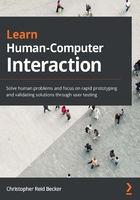
Human-Centered Design Principles
Human-computer interaction (HCI) is more significant than just a set of skills or professions. There is a shared set of human values that bind all of us who participate in the execution of software. HCI skills apply to our roles as we produce software products, websites, or any other computer-related solutions. The collection of skills we are learning and practicing is also part of a bigger picture that joins together with the long line of designers, developers, technologists, and creators who have made humanity better with their ideas and contributions.
Throughout this chapter, we will be covering human-centered design principles that support the HCI profession. Human-centered design (HCD), sometimes called user-centered design (UCD), is a design process that focuses on the user throughout iterative design cycles. The design process allows design teams to create useable, useful, accessible, and potentially delightful user experiences over time. At its core, HCI attempts to solve the underlying issues experienced by their users and not just the symptoms. The goal of this chapter is to give you the skills to identify symptoms and seek out the deeper issues that exist with your users.
The topics you will be learning in this chapter are as follows:
- Understanding the HCI ethos
- How HCI is standing on the shoulders of giants
- Designing continually better software